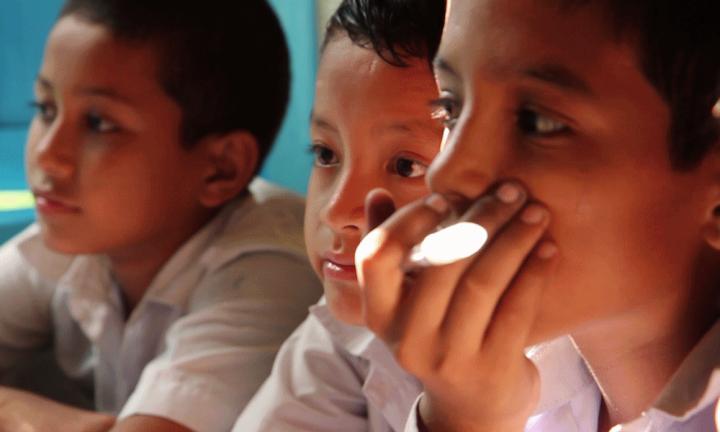
Credit: Th. Pilgrim
Rheumatic heart disease (RHD) develops as a long term complication of childhood streptococcal angina. Latent RHD can be detected with echocardiography years before it becomes symptomatic. RHD is curable when treated early with medication.
RHD is responsible for over 300 000 deaths worldwide each year, accounting for just over two-thirds of all deaths from valvular heart diseases. RHD is disproportionally prevalent across sub-Saharan Africa, South Asia and the Pacific Islands and largely a phenomenon of marginalized communities in developing and emerging countries whereas it disappeared mostly in developed countries like Switzerland.
RHD reduction by two thirds in schools with early detection screening
The most important finding of the study was a significant reduction of RHD in schools with previous echocardiographic screening for silent disease, followed by antibiotic prophylaxis in children with echocardiographic evidence of RHD. In schools, where children with RHD were treated after initial screening, a reduction of the prevalence of RHD by two thirds was achieved.
Prof. Thomas Pilgrim points out: “The results of our study support the hypothesis that early detection of clinically silent RHD and timely initiation of secondary antibiotic prophylaxis are an effective approach to control RHD in endemic regions.”
Sound, large-scale study
The research team looked at 35 schools (clusters) that were randomly allocated to an experimental group or to a control group (methodology of a cluster randomized clinical trial): 19 were included in the experimental group and 16 schools were assigned to the control group. In the 19 schools, the systematic initial screening was followed by antibiotic prophylaxis in children found to have RHD. After more than four years, all children in the screening group (n=2648) and the control group (n=1325) were examined for RHD by echocardiography.
Particular challenges of field research in Nepal
The publication sparked a lively discussion shortly after its publication in «JAMA cardiology» on January 20, 2021. The practical challenges of large-scale screening in economically disadvantaged areas were mentioned on several occasions. Also particular to this study was the aftermath of two devastating earthquakes and political instability during the study period. It is an extraordinary achievement to conduct scientific research with sound data in this environment. In «TCT.MD of the Cardiovascular Research Foundation», Prof. Partho Sengupta, MD, MBBS (West Virginia University Heart and Vascular Institute, Morgantown) describes the study as «very carefully and meticulously executed” and explains that it “fills an important gap in the early detection and treatment of RHD.»
What’s next?
In order to carry out extensive screening projects in economically disadvantaged regions, various hurdles, some often high, have to be overcome. These include training specialists and doctors as well as ensuring consistently high quality across all areas and project phases. There are also financial challenges. For the Sunsari district, the study calculated total costs for comprehensive screening over ten years of 1.4 million USD, which corresponds to an amount of almost 5 USD per child or 483 USD per detected RHD case.
###
Media Contact
Marcel Wyler
[email protected]
Original Source
http://www.
Related Journal Article
http://dx.




